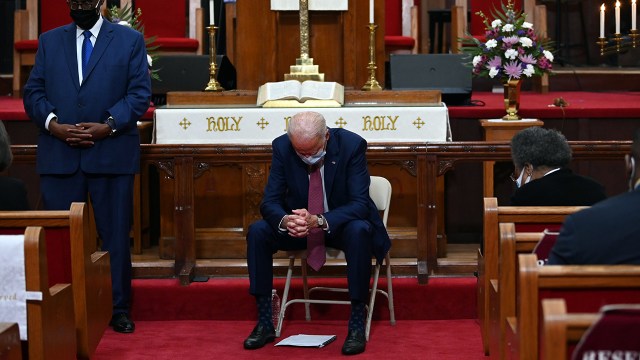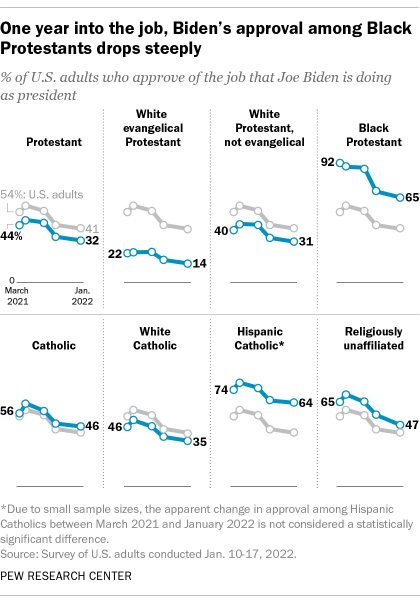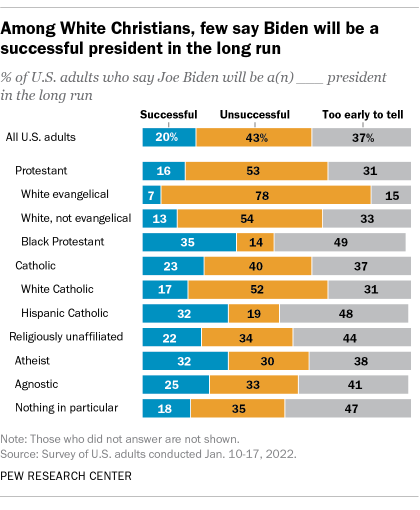
About a year into his presidency, Joe Biden’s job approval rating is much lower among the U.S. public overall – and among most demographic groups – than it was in the early months of his administration. The changes in Biden’s job ratings also are evident among several Christian subgroups and religiously unaffiliated Americans. While his rating continues to be low among White Christians, especially White evangelical Protestants, there have been sizable declines in positive ratings from Black Protestants and the religiously unaffiliated – two groups that are among the Democratic Party’s most loyal constituencies.
Roughly two-thirds of Black Protestants (65%) approve of the job that Biden is doing as president, according to a Pew Research Center survey conducted Jan. 10-17. That is down sharply from 92% in March 2021, shortly after he took office.
Pew Research Center conducted this analysis to examine how views of President Joe Biden’s job performance differ by religious affiliation near the one-year mark of his term. For this analysis, we surveyed 5,128 U.S. adults in January 2022. Everyone who took part in this survey is a member of the Center’s American Trends Panel (ATP), an online survey panel that is recruited through national, random sampling of residential addresses. This way nearly all U.S. adults have a chance of selection. The survey is weighted to be representative of the U.S. adult population by gender, race, ethnicity, partisan affiliation, education and other categories. Read more about the ATP’s methodology.
Here are the questions used for this report, along with responses, and its methodology.
Religiously unaffiliated adults also are increasingly skeptical about Biden’s job performance. Today, 47% of religious “nones” – respondents who describe their religious identity as atheist, agnostic or “nothing in particular” – approve of Biden’s performance, down from 71% in April 2021 and 65% in March 2021. The share of “nones” who now approve of Biden is the lowest it has been since his inauguration, falling below the previous low of 55% in September 2021.
Although the surveys analyzed here include respondents from many religious backgrounds, including Jews, Muslims, Hindus, Buddhists and others, they did not have enough interviews with members of these religious groups to report separately on their views about Biden.
The January survey was conducted ahead of the two-year anniversary of the U.S. coronavirus outbreak, and as Congress was bogged down on key pieces of Biden’s agenda.
White evangelical Protestants’ support of Biden has been consistently low, with the share who now disapprove of him similar to the share who approved of former President Donald Trump at the height of Trump’s popularity. Currently, 14% of White evangelicals approve of Biden’s job performance, down from 22% last March. White Protestants who are not evangelical are somewhat more positive in their assessments of Biden, but his standing among this group has fallen as well: 31% of White non-evangelical Protestants now approve of his performance, down from 40% in March 2021.
Biden’s ratings among various religious groups reflect differences in how those groups identify politically. Black Protestants and religiously unaffiliated Americans have long been staunchly Democratic. Nine-in-ten Black Protestants (91%) voted for Biden in 2020, as did seven-in-ten nones (71%), according to Pew Research Center’s validated voter study.
White evangelical Protestants, by contrast, are among the most solidly and consistently Republican religious groups in the United States, and they have grown even more Republican in recent decades. Among White evangelical Protestants, just 15% cast their votes for Biden in the 2020 election, while 84% voted for Trump.
In the most recent survey, Biden’s job approval rating has also declined notably among his fellow Catholics, though levels of support among Catholics continue to differ by race.
Among Catholics overall, 46% now approve of Biden’s performance, down from 56% in March 2021. Among White Catholics, a clear minority (35%) now approve of Biden, down from 46% last March. Among Hispanic Catholics, 64% approve of Biden’s job performance. From the start of his presidency, support for Biden has been lower among White Catholics than among Hispanic Catholics, reflecting broad racial and ethnic divides in partisanship.
Biden often speaks about his Catholic faith, and in March 2021, most U.S. adults said they believe Biden is at least somewhat religious. However, Catholics have been divided along partisan lines about Biden’s adherence to Catholic teachings, and some U.S. Catholic leaders say he should be denied communion due to his stance on abortion.
Looking ahead to the rest of his term, religious groups in the U.S. also differ in their views of whether Biden will be a successful president or not. Overall, 20% of American adults say Biden will be a successful president, while roughly twice that share (43%) say he will be unsuccessful and 37% say it is too early to tell.
Among those who affiliate with a religion, Black Protestants (35%) and Hispanic Catholics (32%) are most likely to believe Biden will be a successful president – though the most common response in both groups is that it is too early to tell. Conversely, just 7% of White evangelical Protestants believe he will be a successful president while an overwhelming majority (78%) say he will be unsuccessful.
Few White non-evangelical Protestants (13%) and White Catholics (17%) predict Biden will be a successful president, while roughly half in each group say he will be unsuccessful.
Among the religiously unaffiliated, 22% say Biden will be successful, while 34% say he will be unsuccessful and 44% say it is too early to tell.
Note: Here are the questions used for this report, along with responses, and its methodology.





